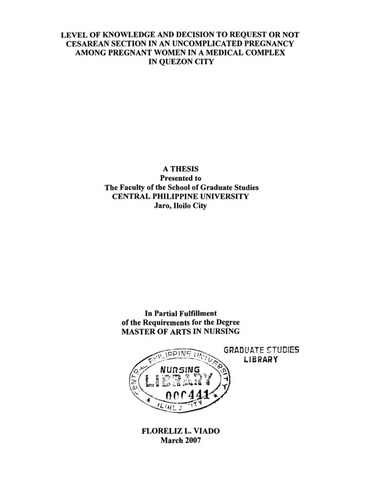Level of knowledge and decision to request or not cesarean section in an uncomplicated pregnancy among pregnant women in a medical complex in Quezon City
| dc.contributor.author | Viado, Floreliz L. | |
| dc.coverage.spatial | Quezon City | en_US |
| dc.date.accessioned | 2021-04-15T07:14:13Z | |
| dc.date.available | 2021-04-15T07:14:13Z | |
| dc.date.issued | 2007 | |
| dc.identifier.citation | Viado, F. L. (2007). Level of knowledge and decision to request or not cesarean section in an uncomplicated pregnancy among pregnant women in a medical complex in Quezon City (Unpublished Master's thesis). Central Philippine University, Jaro, Iloilo City. | en_US |
| dc.identifier.uri | https://hdl.handle.net/20.500.12852/783 | |
| dc.description | Abstract only | en_US |
| dc.description.abstract | This study aimed to determine the level of knowledge on cesarean section and its relationship with women’s decision to request or not cesarean section in an uncomplicated pregnancy among pregnant women in a medical complex in Quezon City. Using purposive sampling, ninety-one pregnant women, having their prenatal check-up in a medical complex in Quezon City for the whole month of September, were asked to answer a questionnaire. The questionnaire gathered information on the following areas: personal profile, knowledge on cesarean section, and decision regarding requesting cesarean section in an uncomplicated pregnancy. The respondents were found to be mostly 18-30 years old, college-educated, nullipara (has never given birth to a baby that is twenty weeks or more, dead or alive), and engaged in non-medically related work. They were found to have high-level knowledge of cesarean section, specifically in terms of indication and benefits. Their knowledge on cesarean section in terms of procedures, however, was moderate to high, while in terms of postpartum care and risks, it was moderate to low. This suggests limited knowledge on many aspects of the cesarean section. The study further revealed that there is no significant relationship between the profile of the respondents and their level of knowledge on cesarean section, as well as their decision to request or not cesarean section in an uncomplicated pregnancy. There is also no significant relationship between the profile of the respondents and their decision to request or not cesarean section in an uncomplicated pregnancy, even when level of knowledge was controlled (except for age). However, a significant relationship between age and decision emerged among women who have high level of knowledge on cesarean section. As most of the respondents chose not to request cesarean section in an uncomplicated pregnancy, therefore the viewed increasing trend on cesarean section per request, as mentioned in the early part of this study, is not necessarily true among the respondents of this study. The most common reason for requesting cesarean section in an uncomplicated pregnancy is “baby’s safety”, the doctors/obstetricians usually help women decide what method to choose in an uncomplicated pregnancy. | en_US |
| dc.format.extent | xvi, 112 pages | en_US |
| dc.language.iso | en | en_US |
| dc.subject.ddc | GSL Theses 610.73072 V65 | en_US |
| dc.subject.lcsh | Pregnant women | en_US |
| dc.subject.lcsh | Childbirth | en_US |
| dc.subject.lcsh | Cesarean section | en_US |
| dc.subject.lcsh | Pregnancy | en_US |
| dc.subject.lcsh | Philippines--Quezon City | en_US |
| dc.subject.lcsh | Pregnancy--Decision making | en |
| dc.subject.lcsh | Pregnant women--Decision making | en |
| dc.subject.mesh | Cesarean Section | en_US |
| dc.subject.mesh | Pregnant Women | en_US |
| dc.subject.mesh | Pregnancy | en_US |
| dc.title | Level of knowledge and decision to request or not cesarean section in an uncomplicated pregnancy among pregnant women in a medical complex in Quezon City | en_US |
| dc.type | Thesis | en_US |
| dc.description.bibliographicalreferences | Includes bibliographical references | en_US |
| dc.contributor.chair | David, Fely P. | |
| dc.contributor.committeemember | Delicana, Lilia A. | |
| dc.contributor.committeemember | Chin, Fely P. | |
| dc.contributor.committeemember | Gubatanga, Virginia, J. | |
| dc.contributor.committeemember | Yoro, Carolyn L. | |
| dc.contributor.department | School of Graduate Studies | en_US |
| dc.description.degree | Master of Arts in Nursing | en_US |


